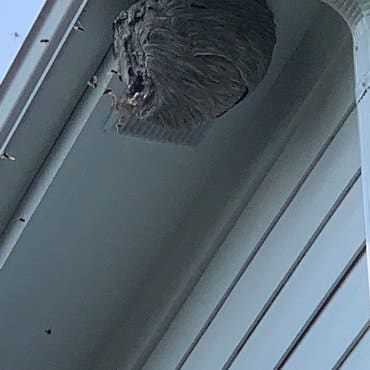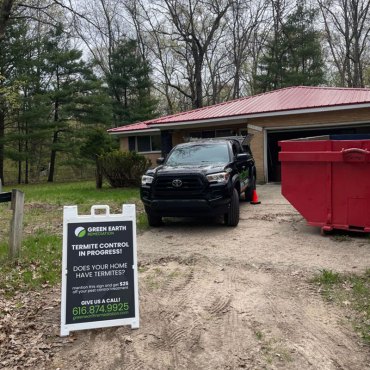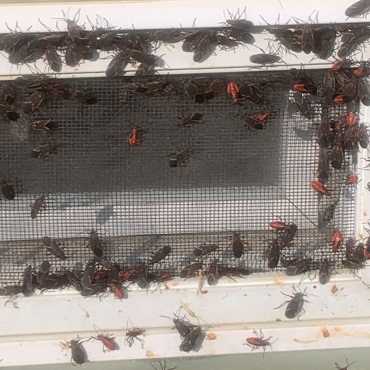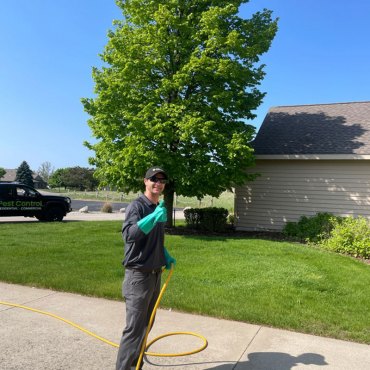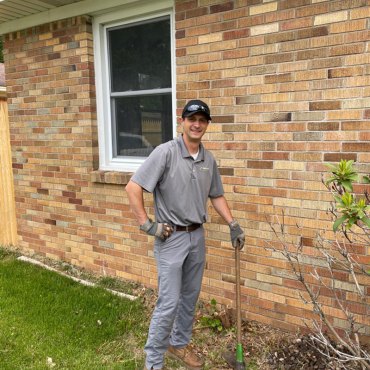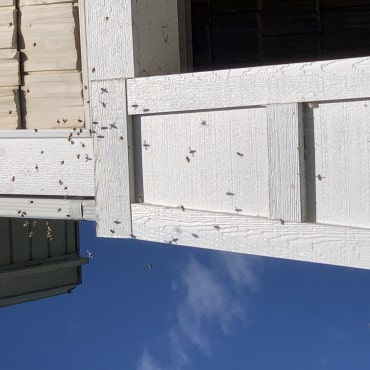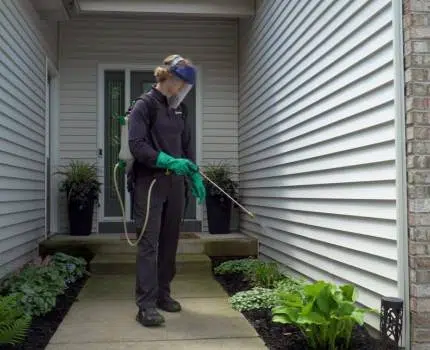
Effective Solutions to Solve Your Pest Problem
Not all residential pest control services are alike. While some companies simply offer generic solutions to complex problems, our residential pest control company takes a more personal, comprehensive approach. We believe in resolving your pest problem at the source, rather than simply keeping pest infestations at bay with continual application of pesticides.
What Pest Can We Help You With Today?

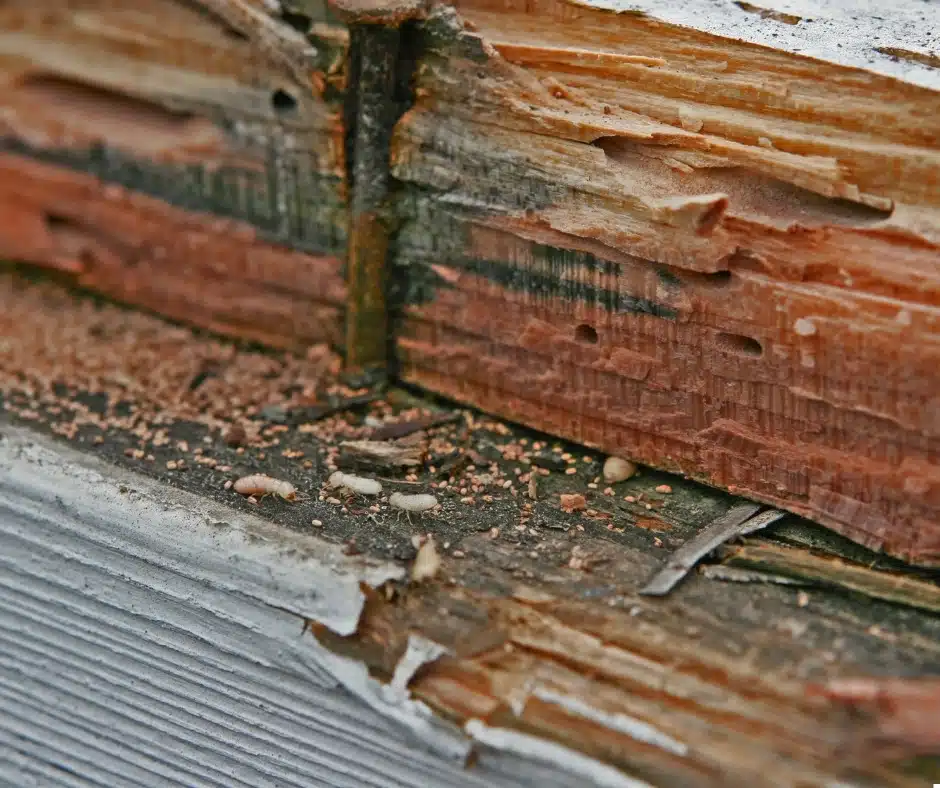
Termite Infestation: A Residential Success Story
Learn how a thorough inspection and targeted treatment eliminated a severe termite infestation, saving a home from extensive damage and ensuring long-term protection.
When to Call for Residential Pest Control Services
Pest infestations are more than an aesthetic problem.
Some pests, such as termites, can cause significant structural damage to your home. Others, such as fleas, bed bugs, and cockroaches, can cause health concerns by aggravating asthma and allergy symptoms, causing skin irritation, and spreading disease.
Effective pest control is essential to prevent health hazards associated with pests. For comprehensive home pest control guidance, visit the CDC’s pest control information page.
In many cases, you’ll know it’s time to call for residential pest control services when you spot pests like stinging insects, bed bugs, spiders, or carpenter ants on your property. However, there are also some pests that can linger in the shadows, but they will leave signs of their presence, such as droppings, unusual smells or noises, greasy residue, damage to fabrics and furniture, and signs of nesting. If you notice these signs, don’t wait to schedule residential pest inspection services. We can quickly identify the source of the problem and offer a customized treatment plan that’s right for your home.
Any type of pest control should be left to the professionals at Green Earth Remediation. Trying to tackle a pest infestation on your own could lead to injuries and exposure to toxic chemicals. Our team has extensive training to understand how pests behave and how to get rid of them for good, without compromising the health of your family or the safety of the environment.
Customer Service, It’s What We Do
Green Earth Remediation is proud to be a leading provider of radon testing, radon mitigation, and pest control services for commercial and residential clients. With any service we provide, we aim to offer a top notch customer experience. We’re always willing to go the extra mile to ensure you get the service you need, right when you need it. If you are dealing with a pest infestation or high radon levels, don’t hesitate to reach out to our professional team.
We have decades of experience.
We deliver guaranteed results.
We have a team of experts on hand.
We work quickly to provide effective, long-lasting solutions.
Our Residential Pest Control Solutions: Bed Bugs, Termites...
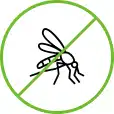
Mosquitoes
Ticks
Bedbugs
Fleas
Cockroaches
Mosquitoes
Mosquitoes are small, flying insects known for their irritating bites and ability to spread diseases like West Nile virus, Zika virus, and malaria. They thrive in areas with standing water, such as ponds and puddles. These pests are most active during dawn and dusk.
Habitat: Mosquitoes need standing water to lay their eggs. Common breeding sites include ponds, puddles, and containers like birdbaths, gutters, and discarded containers. Even small amounts of water in plant saucers or old tires can become breeding grounds.
Risks: Besides their itchy bites, mosquitoes pose serious health risks to humans and pets by transmitting various diseases.
Control Methods:
- Chemical Treatments: Insecticides for adults and larvae.
- Source Reduction: Eliminating standing water.
- Biological Controls: Introducing natural predators like fish.
Ticks
Ticks are small, parasitic arachnids that feed on the blood of mammals, birds, and sometimes reptiles. They are commonly found in wooded and grassy areas. These pests can latch onto hosts and remain undetected for long periods.
Habitat: Ticks thrive in wooded and grassy areas where they wait for a host to pass by.
Risks: Ticks can transmit diseases like Lyme disease and Rocky Mountain spotted fever, posing significant health risks.
Control Methods:
- Chemical Treatments: Acaricides to kill ticks.
- Vegetation Management: Maintaining lawns and yards.
- Protective Measures: Wearing long sleeves and using tick repellents.
Bedbugs
Bedbugs are small, brownish insects that feed on the blood of humans and animals, often while they sleep. They are typically found in cracks and crevices in and around beds and furniture. Bedbugs are notorious for causing discomfort through their bites.
Habitat: Bedbugs are commonly found in cracks and crevices in and around beds, furniture, and baseboards. They can also hide behind wallpaper, inside electrical outlets, and in luggage, making them difficult to detect and eliminate.
Risks: While not known to spread diseases, bedbugs cause itching and potential allergic reactions through their bites.
Control Methods:
- Heat Treatments: High temperatures to kill bedbugs.
- Chemical Treatments: Insecticides application.
- Physical Removal: Vacuuming and steam cleaning.
Fleas
Fleas are small, flightless insects that feed on the blood of mammals and birds, often infesting pets and homes. They are frequently found in pet bedding, carpets, and furniture. Fleas are known for their ability to jump long distances.
Habitat: Fleas thrive in pet bedding, carpets, and upholstered furniture where they can easily find hosts.
Risks: Fleas can transmit tapeworms and cause allergic reactions in pets and humans, leading to discomfort and health issues.
Control Methods:
- Chemical Treatments: Flea sprays, powders, and shampoos.
- Environmental Control: Washing pet bedding and vacuuming.
- Biological Control: Introducing nematodes that prey on flea larvae.
Cockroaches
Cockroaches are resilient insects known for thriving in various environments including our homes. They prefer warm, moist areas like kitchens and bathrooms. Cockroaches can survive in harsh conditions and reproduce quickly.
Habitat: Cockroaches are often found in warm, moist environments such as kitchens, bathrooms, and basements.
Risks: Cockroaches can spread diseases, contaminate food, and trigger allergies and asthma, making them a significant health hazard.
Control Methods:
- Chemical Treatments: Insecticides and baits.
- Sanitation: Keeping spaces clean and free of food debris.
- Exclusion: Sealing cracks and gaps to prevent entry.
...and More
Keep your home safe and sanitary with residential pest control solutions that are safe and effective. Our residential pest control solutions can treat a wide range of pests, including:
Bees
Beetles
Wasps
Hornets
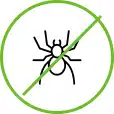
Spiders
Ants
Flies
Ladybugs
Earwigs
Mites
Fleas
Moths
Stinkbugs
Mice
Rats
Pantry Pests
Residential Pest Control Tips
By adopting these DIY prevention strategies, homeowners and businesses can greatly minimize the likelihood of pest infestations. Implementing these measures safeguards property and health while bolstering overall pest control efforts.
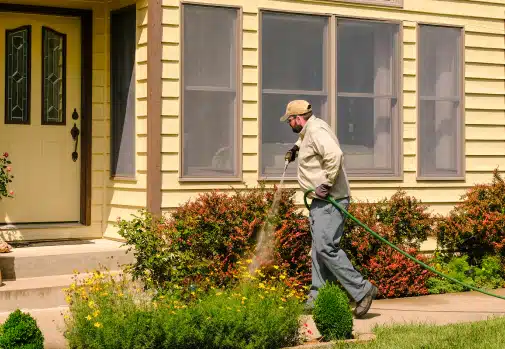
For more detailed DIY pest control tips, visit the EPA’s Do’s and Don’ts of Pest Control page.
Keep Your Home Clean: Ensure your home stays pest-free by maintaining cleanliness, especially in kitchens and dining areas. Store food in airtight containers to keep pests out and promptly clean up spills and crumbs. Regularly dispose of garbage and use trash bins with tight-fitting lids to prevent pests from accessing waste.
Secure Entry Points: Regularly inspect your home for cracks, gaps, and holes, and seal them with caulk or other appropriate materials. Install door sweeps and weather stripping on doors and windows to block pest entry. Repair any damaged screens on windows and vents to keep pests out.
Manage Outdoor Spaces: Maintain your yard by regularly mowing the lawn and trimming bushes and trees away from the house. Eliminate standing water from flowerpots, gutters, and birdbaths to stop mosquitoes from breeding. Store firewood and other materials away from the home’s foundation to reduce hiding spots for pests.
Conduct Regular Inspections: Perform regular checks around your home, focusing on areas where pests are likely to be found, such as basements, attics, and crawl spaces. Look for signs of pest activity, such as droppings, gnaw marks, and damaged food packaging, and address any issues immediately to prevent infestations from worsening.
Use Natural Repellents: Employ natural repellents to keep pests at bay. Essential oils like peppermint, lavender, and eucalyptus can deter pests like ants, spiders, and mosquitoes. Use citrus peels to repel ants and apply diatomaceous earth in areas where crawling insects are found. Plant pest-repelling herbs, such as basil, mint, and rosemary, around your home.

Hear from our Residential Pest Control Customers
We are proud to have hundreds of positive reviews on Google from our pest control clients. We invite you to check out some of our recent reviews below or check out our Reviews page for more.








Find Your Local Service Provider
Green Earth Remediation has numerous locations, and we’re constantly expanding, allowing us to provide the same great service to a growing number of communities. Wondering if we’re in your neighborhood? Check out the map to see areas we’ve served.
Need pest control or radon testing and mitigation services near you? Contact us today!
Home Pest Control FAQs
Do you provide pest control services in the winter time?
Our residential pest control specialists are available year-round. While some pests like mosquitos and termites are more active in your home during the warmer months, others may be active year-round and require ongoing treatment.
I keep my home clean and tidy. Do I really need pest control services?
Do you treat termites?
Why can’t I spray for bugs myself?
Do you treat bed bugs?
Request Pest Management Solutions
Fill Out the Form for a Tailored Treatment Plan and Free Estimate
"*" indicates required fields
